Creationism controversy evolves
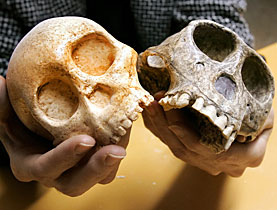
A heated debate over the inclusion of creationism in a school science book highlights the success Swiss evangelicals are having sowing seeds of doubt about evolution.
The debate over the textbook raises questions about why increasing numbers of Swiss are willing to turn away from science and accept creationist views that God created the earth a few thousand years ago.
The school authorities in canton Bern quickly revised the brochure included in the textbook after it was harshly criticised by scientists and education experts.
The controversial passage presented creationism and evolution as two ways of “explaining” the origin of the universe and life on earth. Critics of teaching creationism in science classes say it suggests there is a controversy when there isn’t one since evolution has been proven beyond all reasonable doubt.
Even one of the authors admitted that the 12- to 14-year-olds who were to use the book could get the wrong impression that one theory was just as valid as the other.
The publication came just before the parliamentary assembly of the Council of Europe appealed for members – including Switzerland – to “oppose firmly any attempts at teaching creationism as a scientific discipline”.
In its resolution the council warned that creationist ideas – once an almost exclusively American phenomenon – were spreading throughout Europe and could threaten not only human rights but democracy itself.
Fertile ground
But the Swiss proponents of creationism are working on fertile ground. An international survey last year found that 30 per cent of the Swiss reject evolution, one of the highest rates in Europe.
The fringe Christian organisation Pro Genesis commissioned a survey earlier this year which found that 80 per cent of Swiss want creationism taught alongside evolution in biology class.
“Many people think science is devoid of any meaning of life and this of course makes them critical,” biologist Guido Masé told swissinfo. “That’s why they try to find common ground between science and belief and end up leaning towards a creationist view.”
Masé is curator of an exhibition called Adam, Eve and Darwin, currently running in the northwestern town of Liestal.
The exhibition presents evolution as scientific fact but devotes one floor to the creationism debate. The centrepiece is a virtual discussion between scientists, theologians, representatives of Switzerland’s state-recognised Protestant and Roman Catholic churches and creationists.
Literal translation
Martin Scheidegger, a Protestant pastor and expert on evangelical movements and sects, told swissinfo that the mainstream Swiss churches accept that the goal of scientific research is to uncover how life evolved while religion asks why.
“In that sense the Bible does not contradict scientific knowledge based on Darwin’s theory of evolution,” he said.
According to Scheidegger, evangelical Christian churches are the driving force behind a literal translation of the book of Genesis and the rejection of evolution.
He says more Swiss are joining these movements, even if their popularity is still limited. According to the most recent poll, 2.2 per cent of Switzerland’s 7.5 million inhabitants belong to a free (non-state recognised) church.
His fear is not that they will supplant the mainstream churches but that they will influence the Swiss public with their dogmatic ideology.
“Over the past 15 years, the public has grown more uncertain and that is largely due to globalisation,” Scheidegger said, adding that one of the main impacts has been the loss of traditional values.
“In many ways it’s restitution. That’s something we see in politics too and why the [rightwing] Swiss People’s Party [which presents itself as a champion of traditional Swiss values] has so much support. It’s the same dynamics.”
swissinfo, Dale Bechtel in Liestal
All living organisms – from humans to mountain goats to edelweiss – are distant cousins and have evolved, through random genetic mutations and the non-random process of natural selection, from a single self-replicating molecule that popped into existence by chemical chance some 3.5 billion years ago.
Natural selection is the process by which organisms with traits that are well suited to their environment reproduce more than rivals. Genes that build successful survival machines get passed on more than less “fit” genes.
Evolution via natural selection thus explains how simple organisms can, over millions of years, result in complex organisms seemingly designed for their environment without requiring any supernatural “designer”.
The evidence for evolution is overwhelming – not just in biology and geology, but also physics and cosmology.
The small Swiss creationist group aims to assert creationism over evolution. Its views are represented in the Adam, Eve and Darwin exhibition in Liestal.
It argues the Bible should be interpreted literally and believes the creation of the world took place 6,000-10,000 years ago.
The group is trying to raise funds to build a theme park to promote creationism, with a replica of Noah’s Ark as the showpiece.

In compliance with the JTI standards
More: SWI swissinfo.ch certified by the Journalism Trust Initiative

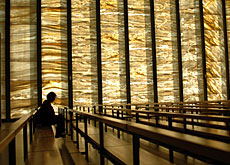
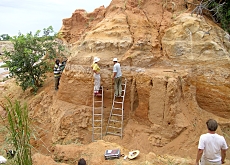
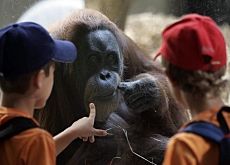
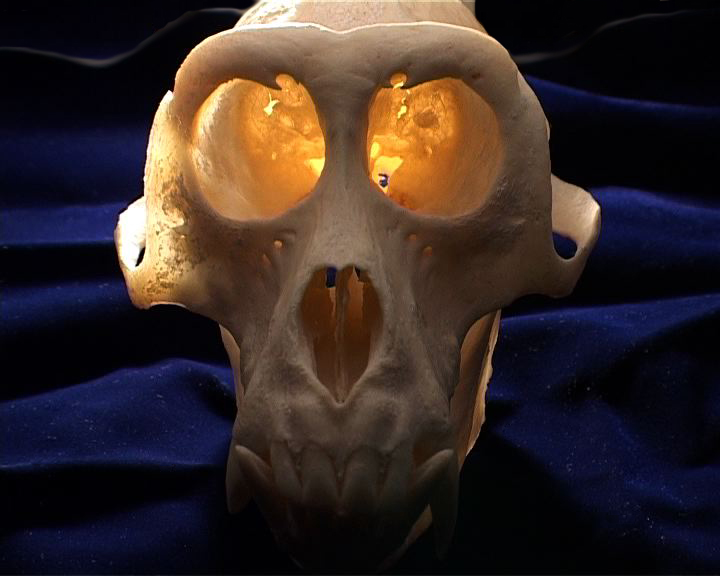
You can find an overview of ongoing debates with our journalists here. Please join us!
If you want to start a conversation about a topic raised in this article or want to report factual errors, email us at english@swissinfo.ch.